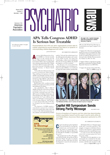A new paradigm for understanding health and treating illness was proposed at the XIIth World Congress of Psychiatry in Yokohama in August.
In the lecture “How the Mind Hurts and Heals the Body—The Science of Psychoendoneuroimmunology,” Oakley S. Ray, Ph.D., called it “a necessary approach to health care in today’s world.”
“Patient-centered care is emerging as a key concept in modern medicine, because it is well known that individuals who are compliant, express interest in their treatment, and work together with their physicians have better outcomes, improved health, and faster recovery than those who do not,” said Ray, a professor of psychiatry and psychology and associate professor of pharmacology at Vanderbilt University.
The validity of this approach is most evident with complex complaints, such as those involving interactions among mind, body, and culture. But it is also applies to physical ailments, although the results might not be as dramatic, according to Ray.
He said there is a need for new modes of characterizing medical problems because nonmedical factors that help people resist illness and live longer are now known.
Research is beginning to clarify how the four systems—psyche, endocrine, neuro, and immune, or PENI—interact to ensure health, fight disease, and delay death. Evidence is also accumulating on what happens when the systems fail.
Fundamental to understanding PENI is an awareness that three of the systems—nervous, endocrine, and immune—have receptors on critical cells that can receive information by messenger molecules from each of the other systems, he explained.
According to the tenets of PENI, the mind or activity of the brain is the body’s first line of defense against illness, aging, and death and for health and well-being.
“Our thoughts, our feelings, our beliefs, and hopes are nothing more than chemical and electrical activity in the nerve cells of our brain. It is literally true that as experience changes our brain and thoughts, that is, changing our mind, we are changing our biology,” he said.
“We already know that what we believe, what we think, has both positive and negative effects on our physical health. The challenge for psychological science is to determine to what extent and what psychobiological mechanisms are involved.”
He said the task of researchers is to specify the psychoendoneuroimmunological conditions under which certain illnesses occur, to identify the mechanisms involved, and to develop interventions to prevent the normal negative consequences or to enhance positive effects.
As an example, he said analyses of sudden deaths or heart attacks reveal that multiple mechanisms are involved. A critical factor is the threshold rate at which fibrillation occurs. He said studies have shown that “psychosocial factors influence the threshold of response” while another, prospective study concluded that while biological reasons are the primary cause for most non-sudden cardiac deaths, psychosocial factors are the most important when it comes to sudden cardiac deaths.
As the complexity of mind-body situations increases so does the difficulty of analysis and the identification of probable mechanisms. He provided two examples of complex mind-body interactions that directly addressed the issue of whether a set of beliefs can hasten the occurrence of death.
One studied Chinese Americans with different levels of conviction in Chinese culture and astrology. Two basic beliefs in Chinese astrology were most relevant: that a person’s fate is strongly influenced by the astrological year of his or her birth and that each astrological year is associated with a body organ or type of illness or symptom.
When a believer in these concepts develops the illness associated with his or her birth year, the Chinese believe that their belief system has been confirmed and that an early death is probable. This study asked the simple question: When an individual committed to this astrological system develops an illness that is associated with his or her birth year, does that person die sooner than individuals with the same illness who were born in a different astrological year or with a lesser degree of commitment to the belief system? The evidence was clear: such people do, indeed, die sooner.
In short, Chinese Americans, but not Caucasians, die significantly earlier than average (1.3 to 4.9 years earlier) if they have a combination of disease and birth year that Chinese astrology and medicine consider ill fated. The more strongly a group is attached to Chinese traditions, the more years of life are lost. These results held true for nearly all major causes of death in the study.
The second example he gave was based on the fact that many Chinese and Japanese people consider the number 4 unlucky, while white Americans do not. Cardiac mortality in Chinese and Japanese people in the United States showed a cardiac mortality peak on the fourth day of the month (1.45 ratio of observed to expected deaths for inpatients) but matched white controls did not (Psychiatric News, June 7).
Ray said that PENI provides the concepts and the components to change the way people view much of the world. The components of PENI are the neurotransmitters and hormones and cytokines that act as messenger molecules carrying information between the nervous, endocrine, and immune systems.
“The concepts underlying PENI are that thought processes are the functioning of the brain, and as we change our mind—our thoughts—we change our brain and therefore our body,” he said.
Ray said that recent research provides compelling evidence of mind-brain-body interactions at the organismal, cellular, and molecular level that can impact on the health and quality of life of individuals.
“The consequences of shifting to this new paradigm and obtaining a clearer and better understanding of the interactions among the components of PENI will be beneficial to many, including all who work in the broad area of health care,” he said. ▪
